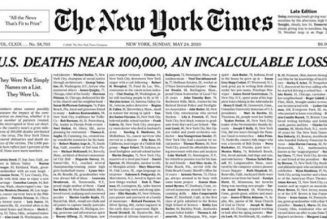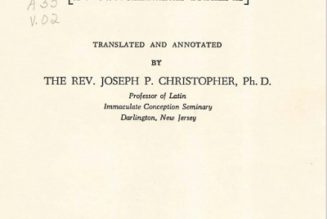By Fr. Jerry Pokorsky ( bio – articles – email ) | Dec 10, 2024
The Word of God came to John in the wilderness. John “went into all the region about the Jordan, preaching a baptism of repentance for the forgiveness of sins. As it is written in the book of the words of Isaiah the prophet, ‘The voice of one crying in the wilderness: Prepare the way of the Lord, make his paths straight.’” (Lk. 3:2-4)
God’s law is perfectly compatible with human nature and is the benchmark of human behavior. Repentance begins by acknowledging our departure from the precepts of God’s law.
Eternal law
God is the author of every nature. The eternal law is the plan of divine wisdom that directs all the actions and movements of created things. God created everything in the universe. Man participates in eternal law in two ways: by reasoning and by action. We are subject to the eternal law. The virtuous habitually comply with eternal law (cf. Saint Thomas Aquinas).
Natural law
Believers and unbelievers alike can grasp the basic tenets of natural law. As we reasonably look at human nature, actions, and social realities, we conclude that good morality includes refusing to murder, steal, lie, and so on. Natural law is universal.
Human law
Human law is only valid if it conforms to natural law. Human law is “an ordinance of reason for the common good, made by him who has care of the community, and promulgated.” If a law is unjust, it cannot bind in conscience and is a perversion of law.
Power is not the basis of a just law. As an ordinance of reason, a law must be reasonable. A good law serves the common good, not merely the good of the lawmaker or a special interest group. A proper authority who has “care of the community” promulgates the law, not imposed by outsiders. A promulgation of a law is just because we must know laws to obey them.
Some add “enforceable” to the definition because the multiplication of unenforceable laws, like monetary inflation, devalues the weight of the law or makes laws capricious. As bureaucracies expand, regulations multiply and, paradoxically, discourage compliance and even make compliance impossible.
The Ten Commandments summarize God’s law and natural law. All just human laws are rooted in the Commandments. Violations of the Commandments are sinful.
Sin
Sin has three components. 1) A thought, word, or deed that violates God’s law. 2) We know the act is wrong, and 3) We freely render our consent to the act.
God commanded Adam and Eve not to eat from the Tree of Good and Evil. (Why would they need to know evil in a place of perfect goodness?) They saw the fruit, ate it in freedom, and disobeyed God. Adam blamed Eve, and Eve blamed the serpent, but the blame-game gambit didn’t work. They were guilty as charged.
Every sin carries its own peculiar punishment because it violates human nature and natural law. God forgives. Man sometimes forgives. But nature never forgives. A drug addict or alcoholic can ruin his health and receive forgiveness in Confession but still needs to tend to his broken health.
Direct and malicious violations of the Ten Commandments are mortal sins: Deliberately worshiping false gods; after becoming Catholic, returning to non-Catholic worship practices; viciously neglecting parents; murder and hatred; sexual sins; theft; cruel calumny and detraction.
Not all sins are deadly, as St. John teaches. Some sins are venial: small acts of irreverence, naughty disobedience, petty anger, impure glances, and unnecessary gossip. Venial sins are not harmless. Petty gossip can ruin friendships, and texting while driving can lead to terrible car accidents.
Prudential Judgments
Every intrinsically evil act is sinful (with knowledge and consent). However, violating a prudential judgment honestly held in conscience—which allows for honest disagreement—is also immoral. Questions of waging war provide good examples.
The authorities in charge of the common good determine whether a nation goes to war. Dutiful soldiers usually comply. However, a particular soldier, officer, general, or leader may have conscience problems with the decision. If so, conscience binds him to refuse to participate in the war-making. One’s violation of a carefully considered prudential judgment is a sin, just as others may claim a right to go to war on contrary prudential grounds.
As with many things in matters of war, the morality of these decisions becomes clear in retrospect. (It seems—over the many years of American war-making—we should see more people resigning their commissions on conscience grounds, but that’s merely a visceral observation.)
The Sacrament of Penance
Repentance comes to completion in the Sacrament of Penance, where we close the gap between God’s law and our behavior. Confession is a unique gift. Jesus, in the Sacrament of Penance, forgives honestly confessed sins. There is no other venue in the world where we enter a small booth in the strictest of confidence (“seal of Confession”), accuse ourselves of pathological failures—not a pleasant task—and receive the certainty of forgiveness, even if we have to clean up the mess our sins caused.
Many years ago, a young man robbed a bank and went to jail. while the young man was awaiting sentencing, an evangelical pastor introduced Jesus to him, and he was “born again.” When the man appeared before the magistrate, he said, “Judge, I’m guilty, but I found Jesus in jail. So let me off the hook.”
A Catholic who found Jesus would say, “Judge, I’m guilty. I received the forgiveness of Jesus in Confession, so I’m ready to receive your punishment. (But I hope you consider that!)”
In Confession, we need not describe the details of our sins, only the nature and number of mortal sins. Many confessions are “devotional” and include only venial sins. Confessing mortal sins, as circumstances require, to the best of our ability is necessary for confessional integrity. We still have to pick up the pieces after the absolution, with a resolution to sin no more. But our conscience is clear.
Prepare the way of the Lord. Make a good Confession.
Sound Off! CatholicCulture.org supporters weigh in.
All comments are moderated. To lighten our editing burden, only current donors are allowed to Sound Off. If you are a current donor, log in to see the comment form; otherwise please support our work, and Sound Off!

There are no comments yet for this item.









